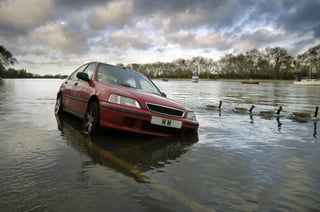 At least twenty parishes in southern Louisiana will now be tasked with the restoration of its communities after the Great Flood of 2016. During these distressed times, it is important to be aware of the safety hazards. Remember, the number one priority is going home safe to your loved ones!!
At least twenty parishes in southern Louisiana will now be tasked with the restoration of its communities after the Great Flood of 2016. During these distressed times, it is important to be aware of the safety hazards. Remember, the number one priority is going home safe to your loved ones!!
While performing demolition on post-flood areas watch for the following hazards:
- Bacteria and viruses: the flood waters could have been exposed to contaminants such as sewage or dead animals. Bacteria and viruses cannot be seen but can be deadly. Exposure routs are through cuts, skin absorption, or touching mouth or eyes with contaminated hands. Wear gloves, wash hands and arms with soap regularly, and use bleach or antibacterial spray on as many items as possible. Leave areas with standing water for last.
- Mold: This will grow rapidly in hot, moist areas. Exposure routs are through skin absorption, touching eyes or mouth with contaminated hands, and inhalation. Keep fans circulating fresh air, remove effected walls/flooring as soon as possible, wear N-,R- or P95 masks, scrub items with a biocide or cleaning products rated to remove mold on all surfaces that were exposed. Items that cannot be cleaned and dried fully must be removed. Further mold remediation information can be found at https://www.osha.gov/SLTC/etools/hurricane/mold.html.
- Electrocution/Fires: Turn breaker off while doing work on buildings/structures. Live wires can cause severe electrocution or fire. Do not touch down power lines; report them to local electrical companies. Damaged electrical wires can also energize fences, water lines, trees and land lines. Wear rubber soled shoes.
- Structural Stability: Building/structures that have been saturated with flood water may not be able to support weight as normal. Contact the local building inspector for structural safety advice before attempting to enter. Inspect the building for damage due to object slamming into from the current in the flood water.
- Power Tools/Pinch Points: Wear safety glasses when cutting or hitting. Keep electrical cords and power cords out of water. Use ground-fault circuit interrupters (GFCIs) or double insulated and grounded equipment.
- Chemical Exposure: Keep generators outside and away from open doors and windows. Always keep generators dry. Be aware of propane lines. Look for any gas cylinders that may have floated onto the work area.
After a flood, a full inspection of the jobsite must be conducted before work can begin. The inspection includes looking for debris, hazardous material, and dead animals that may be in or underneath objects or buildings. Also, a survey should be conducted of the structural stability and electrical damage. The jobsite inspection should be documented, signed by the surveyor/s and filed.

















